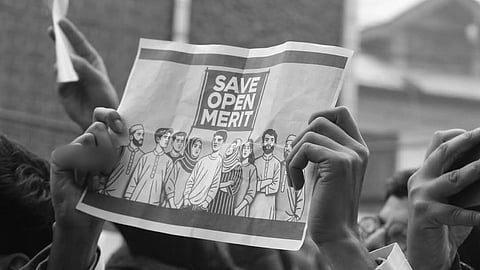

For the past year, General category students in Jammu and Kashmir have been feeling anxious, as the number of open category seats and posts has been reduced in various government exams and recruitment notifications.
For instance, in July 2024, the J&K government decided to allocate only 40 per cent of positions for open merit in government job recruitments, accounting for various reserved quotas. In addition, the open merit quota for postgraduate medical courses was drastically reduced to 26.6 per cent, raising concerns about equitable seat distribution, especially in speciality branches.
Responding to students’ concerns about these developments, J&K’s education minister, Sakina Itto, announced the constitution of a cabinet subcommittee in December 2024 comprising herself, Javed Rana (Minister for Public Health Engineering) and Satish Sharma (Minister for Food, Civil Supplies & Consumer Affairs) to address the problem.
In the meanwhile, a large number of open merit aspirants, led by Member of Parliament Aga Syed Ruhullah Mehdi, protested outside the official residence of Jammu and Kashmir's Chief Minister Omar Abdullah in December 2024. A few students from J&K even protested at Jantar Mantar, Delhi.
Both groups demanded the rationalisation of the reservation quota in government jobs and scholarships per the state's population and demographics.
In a meeting with the protesting students, Omar Abdullah assured them that their demands would be met. However, a Right to Information (RTI) response later revealed that this meeting had no official minutes or follow-up actions, leading to criticism about the government's commitment to addressing the issue.
As two months have passed since the protest and the meeting with CM Abdullah, the students allege that none of their demands have been met, and they were not receiving updates on the progress of the subcommittee.
As a result, they continued to press on the issue under the aegis of the Open Merit Students Association J&K (OMSA), even submitting a draft bill called The Jammu & Kashmir Reservation (Amendment) Bill, 2025 to the state government that would amend the current reservation policy in the state.
Their efforts seemed to have reached fruition, as Dr Bashir Ahmad Veeri, Member of J&K’s Legislative Assembly from the Bijbehara assembly segment, recently announced plans to submit a Private Member Bill based on the draft bill submitted by the OMSA, capping the reserved category seats at 40 per cent, and leaving 60 per cent of the seats for open merit, in the upcoming Assembly sessions.
In addition, the OMSA even initiated a petition on Change.org, collecting signatures to register dissent against the current reservation policy of the state.
Issue worsened by successive governments, say students
The number of seats in the open merit category has been reduced since as early as 2004, says Mir Mujeeb, a member of the OMSA.
“It was the Jammu and Kashmir People's Democratic Party (PDP) and Indian National Congress (INC) coalition government which introduced more quotas to appease certain communities. However, this continued even as the National Conference came to power later, and during the Lieutenant Governor’s rule from 2019 to 2024,” he explains.
In 2024, the J&K Legislative Assembly passed the Reservation Act, providing reservations of not more than 50 per cent in government positions. Now, students allege that the reserved seats are almost 70 per cent.
According to Mujeeb, students from the open merit category began talking about the issue in 2020, using Spaces on Twitter (now X) to raise awareness about the issue. Eventually, as more “like-minded people”, such as doctors, lawyers, scholars, and aspirants for medical exams & government jobs, got together around the issue, they began to rally under the OMSA and began participating in demonstrations against the current reservation policy.
“I was even part of the delegations that met CM Abdullah and the cabinet subcommittee in December 2024,” he says.
The OMSA submitted a charter of demands to the chief minister in their meeting, which included the enforcement of SRO-49 (2018), which mandated 75 per cent of medical seats to be left for open merit, amendment of Rule 17, which allowed students from reserved communities to seek admission through open merit, begin the rationalisation process of the reservation quotas, and correction of “excessive” horizontal reservations.
Among these demands, the CM requested that the government be given time of six months to implement the latter, and that the former two would be implemented immediately — neither of which seem to be upheld.
“Lives of students and aspirants at stake”
As the government continues its inaction on the reservation policy, it is the youth of the union territory that suffer the consequences, says Mujeeb.
“Today, J&K has the highest unemployment rate in India. General category youth are falling prey to drug and alcohol addictions due to joblessness. The government needs to act quickly to save our youth,” he narrates.
With the draft bill now reaching the J&K Legislative Assembly, the OMSA is hopeful that its demands are considered, and the reservation policy is amended to “represent the social dynamics of J&K”.
“As per the latest census data of 2021, 69 per cent of J&K’s population belongs to the general category. The percentage of seats and posts for open merit must reflect these numbers. They cannot expect 60 per cent of the population to compete for 30 per cent of the opportunities,” Mujeeb explains.
He further clarifies that the OMSA is not against affirmative action policies — but rather, their unfair implementation.
“While a Private Member bill might be difficult to pass in the Assembly, this would bring enough public attention to the issue,” he said.
He hopes that the bill does end up getting passed by the Legislative Assembly and that the government issues a whip to impress its provisions into law.
“It is up to both the government and the bureaucracy of the state now. We wish that the government acts as a bulwark of merit, and displays its will to protect the future of general category students. The time for inaction has passed,” Mujeeb adds.
